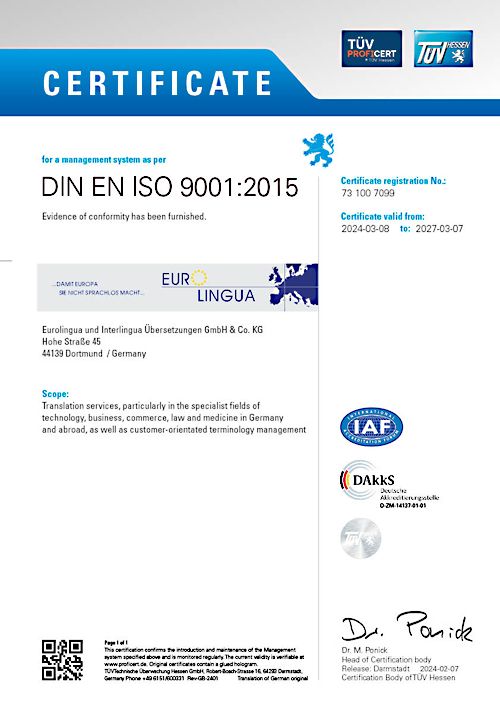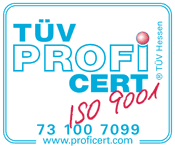
Certification
ISO 9000ff – General quality standards
The general quality standard ISO 9001:1994 was published in 1994 in three official languages. It sets out 20 requirements for a quality management system: responsibility of management, quality management system, contract audit, design control, control of documents and data, procurement, control of products provided by customers, marking and traceability of products, process control, inspections, inspection equipment monitoring, test status, controlling non-conforming products, corrective and preventive measures, controlling quality records, internal quality audits, training, maintenance, statistical methods and handling, storing, packing, preserving and shipping.
It has been revised on several occasions.
The first revision was in 2000 and was a fundamental revision of the contents. The new edition of the standard was switched to process orientation and renamed ISO 9001:2000. It consisted of eight principles: customer orientation, responsibility of management, inclusion of participating persons, process-oriented approach, system-oriented management approach, continuous improvement, task-oriented decision-making approach, supplier relations for mutual benefit.
Further updating took place in 2005/2008 and 2015.
Specific standards for the translation branch
At first, only those in the know were given it: a bundle of papers entitled "Translation project". What this tentative wording wanted to express at the beginning of the 1990s developed into a quality standard after many years of work in the Standards Committee for Terminology (Normenausschuss Terminologie (NAT)) of the DIN Deutsches Institut für Normung e.V.: DIN 2345 Translation Orders. In seven chapters the first standard for the translation branch defined and described the application range, the terms used, the process organisation and the audit procedure. (cf. http://www.tekom.de/index_neu.jsp?url=/servlet/ControllerGUI?action=voll&id=761)
DIN 2345 Translation Orders was updated in 1998, withdrawn in full in 2006 and replaced by DIN EN 15038 Translation Services - Service Requirements.
The standard, which set new benchmarks, showed its intentions immediately in its title and made a series of demands on translation service providers that had not been common up to then: the translation services provider should work with well-trained employees who have a range of competences available - cultural competence, research competence, linguistic competence, native language competence, translating competence, etc. The new standard coined terms such as "translation project", "project manager", "locale", "text type", "register", etc., and stipulated that translation projects are processed in accordance with documented procedures and monitored by project managers.
The standards were developed still further in some areas and in mid-2016 DIN EN 15038 was replaced by the international translation standard DIN EN ISO 17100 Translation Services – Requirements for Translation Services.
ISO 17100 defines the requirements for all aspects of the translation process that are essential for the quality and provision of translation services. It contains provisions for translation service providers "on handling core processes, on the minimum requirements for qualifications, availability and use of resources as well as on other activities that are required for the provision of high quality translation services". Along with a structural redesign, new requirements such as the specific processing of customer feedback, taking data protection regulations into account, or verifying the competences for project managers were included. With regard to technical equipment, express reference was made to the use of translation technology and translation tools.
In 1997, Eurolingua installed a quality management system in accordance with ISO 9001:1994 that it had developed for some time since 1995. The concept of this quality management system made use both of the company's own experience and knowledge that it had acquired since 1989 and of the principles of the draft of "Translation Projects", with which it had been familiar from the start. In this way it was possible to integrate the significant features of the standard DIN 2345 for Translation Projects into Eurolingua's general quality management system. Certification by MPA/NRW was carried out in the same year.
Publication of the standard DIN EN 15038 Translation Services – Requirements for Translation Services enabled Eurolingua to optimise its QM system once again and to enforce the new features of this standard. In addition, Eurolingua developed an independent QM system in accordance with DIN EN 15038:2006 Translation Services – Requirements for Translation Services and had itself certified in May 2010. Certification in accordance with DIN EN ISO 17100, the current standard for translation service providers, took place on 08.03.2017.
Eurolingua has also implemented all updates of the 9000ff standards series and has also been successfully certified since 25.01.2018 in accordance with DIN EN ISO 9001:2015.
This means that Eurolingua and Interlingua are members of the very narrow circle of translation service providers in Germany that work in accordance with the principles and methodology/procedures of these two systems.
In the framework of quality management systems in accordance with the standards DIN EN ISO 9001:2015 and DIN EN ISO 17100 Eurolingua und Interlingua Übersetzungen GmbH & Co. KG has committed itself to compliance with a quality policy with the primary objective of achieving the best possible customer satisfaction and its continuous improvement. External audits and recertifications, and the company's own reviews with regard to compliance with the requirements of the standards and to monitoring the quality policy, constitute major elements of the quality management system.
Eurolingua und Interlingua Übersetzungen GmbH & Co. KG ensures that the processes that are required for the preparation of high quality, scientifically substantiated and on-schedule translations are defined, planned and realised. The QM system also takes other factors into account that have a great influence on the quality of products and services, such as the company's strategic alignment, regulatory and statutory requirements, or knowledge management in the company. Customer orientation is extended by target groups such as employees, suppliers and service providers. Risks and chances are analysed and evaluated, measures stipulated to minimise risks and their efficacy monitored.

In contrast to an autonomously submitted declaration of conformity Eurolingua has two quality management systems that have been audited by an independent notified body.









 Back to top
Back to top